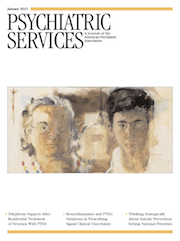Concordance Between Measured and Self-Perceived Weight Status of Persons With Serious Mental Illness
Abstract
Objective:
This study investigated concordance between self-perceived and measured weight status for persons with serious mental illness.
Methods:
A total of 586 mental health clients assessed their weight as underweight, normal, overweight, or obese. The agreement between these self-assessments and the same categories based on measured body mass index was related to gender, ethnicity, education, age, and psychiatric diagnosis.
Results:
Three hundred consumers (51%) underestimated their weight (they thought they weighed less than they did); only 35 (6%) overestimated it. In logistic regression analyses, gender, education, and psychiatric diagnosis showed significant effects on accuracy of self-perception, but ethnicity and age did not.
Conclusions:
People with serious mental illness are more likely than others to have weight problems, which contribute to higher rates of morbidity and mortality. However, they also tend to underestimate their weight. This gap between reality and self-perception must be addressed.



